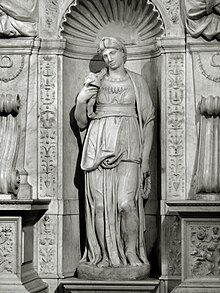লিয়া
Leah | |
|---|---|
לֵאָה | |
 | |
| জন্ম | |
| মৃত্যু | |
| দাম্পত্য সঙ্গী | Jacob (cousin/husband) |
| সন্তান | |
| পিতা-মাতা |
|
| আত্মীয় | See list
|
লীয়া[ক] (/ˈliːə/) হিব্রু বাইবেলে বাইবেলীয় পিতৃপুরুষ যাকোবের দুই স্ত্রীর একজন হিসেবে আবির্ভূত হয়েছেন। লীয়া যাকোবের প্রথম স্ত্রী এবং তার দ্বিতীয় (এবং প্রিয়) স্ত্রী রাহেলের বড় বোন। তিনি যাকোবের প্রথম পুত্র রূবেণের মা। সিমিয়ন, লেবি এবং যিহূদা নামে তার আরও তিন পুত্র রয়েছে, কিন্তু রাহেল তাকে কিছু ম্যানড্রেক মূলের (דודאים, dûdâ'îm) বিনিময়ে যাকোবের সাথে এক রাতের প্রস্তাব দেওয়ার আগ পর্যন্ত তিনি আর কোন পুত্রের জন্ম দেননি। এর পর লীয়া আরও দুই পুত্রের জন্ম দেন, ইষাখর এবং সবূলূন এবং যাকোবের একমাত্র কন্যা দীনার জন্ম দেন।
নাম[সম্পাদনা]
লিয়া নামের অর্থ "বুনো গরু", যা ইনানা, উরাস এবং নানশের মতো প্রাচীন দেবীদের একটি সাধারণ উপাধি। র্যাচেলের অর্থ "ভেড়ার বাচ্চা"।[৪] নোয়েগেল বলেন যে এই বিবরণের মধ্যে লবণের পালের সাথে একটি বিদ্রূপ রয়েছে, যার মধ্যে একটি জেনারেটিভ কাজের উপর ভিত্তি করে - আমাকে আমার স্ত্রী দাও কারণ আমার দিন পূর্ণ হয়েছে, যাতে আমি তার কাছে যেতে পারি (אליה) (29:21)। "এখানে লিয়ার নামের উপর একটি সূক্ষ্ম শ্লেষ রয়েছে, যা 29:23-এ আবার ঘটে।"[৫]
তথ্যসূত্র[সম্পাদনা]
- ↑ Meyers, Carol L.; Craven, Toni; Kraemer, Ross Shepard, সম্পাদকগণ (২০০১), Women in Scripture: A Dictionary of Named and Unnamed Women in the Hebrew Bible, the Apocryphal/Deuterocanonical Books, and the New Testament, Grand Rapids, Michigan: William B. Eerdmans Publishing Company, পৃষ্ঠা 108, আইএসবিএন 9780802849625
- ↑ Hepner, Gershon (২০১০), Legal Friction: Law, Narrative, and Identity Politics in Biblical Israel, Bern: Peter Lang, পৃষ্ঠা 422, আইএসবিএন 9780820474625
- ↑ "ab [COW]", The electronic Pennsylvania Sumerian Dictionary, Philadelphia, Pennsylvania: University of Pennsylvania Museum of Archaeology and Anthropology, ওসিএলসি 163207721
- ↑ Veldhuis, Niek (২০০২)। "Studies in Sumerian Vocabulary: dnin-ka6; immal/šilam; And še21.d"। Journal of Cuneiform Studies। American Schools of Oriental Research। 54: 67–77। আইএসএসএন 0022-0256। জেস্টোর 1360043। সংগ্রহের তারিখ ২০২৩-১২-১২।
- ↑ Noegel, Scott B. (১৯৯৭-০১-০১)। "Sex, Sticks, and the Trickster in Gen. 30:31-43"। Journal of the Ancient Near Eastern Society। 25 (1): 15। সংগ্রহের তারিখ ২০২৩-১১-০৩। however, note that references to bovines and their fertility would not have been an unkind association in the ancient near East, where the cultural attitude toward cattle is reflected by the ubiquity of boviform gods.
উদ্ধৃতি ত্রুটি: "lower-alpha" নামক গ্রুপের জন্য <ref> ট্যাগ রয়েছে, কিন্তু এর জন্য কোন সঙ্গতিপূর্ণ <references group="lower-alpha"/> ট্যাগ পাওয়া যায়নি
